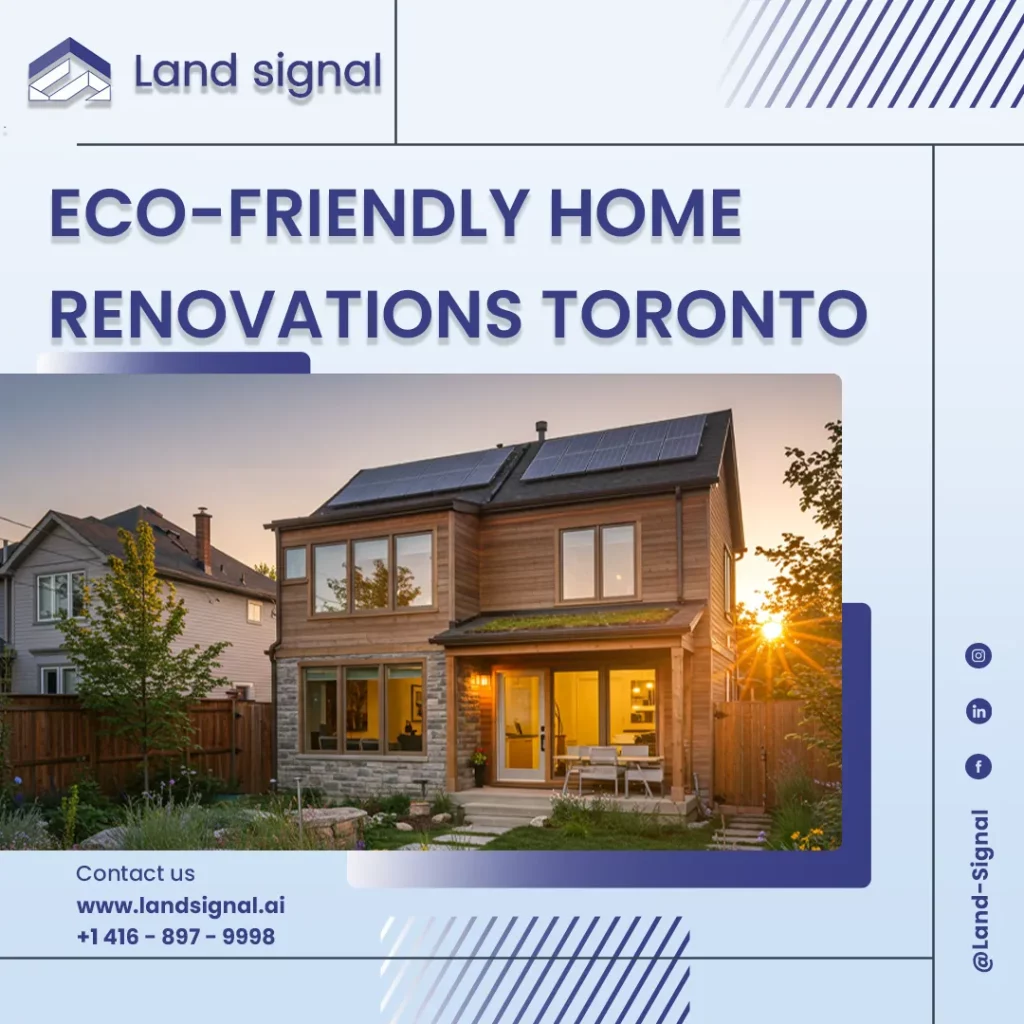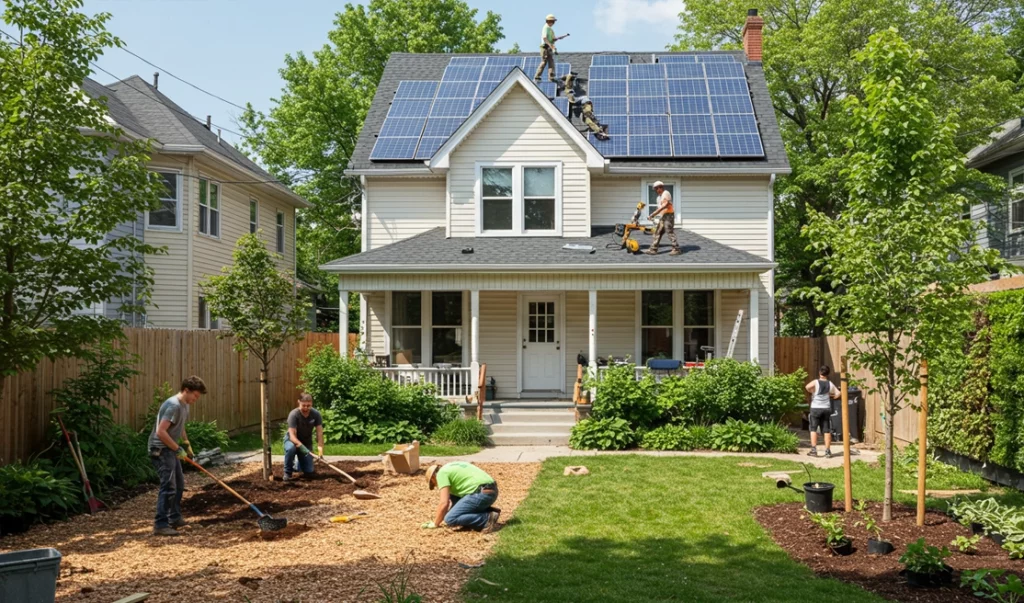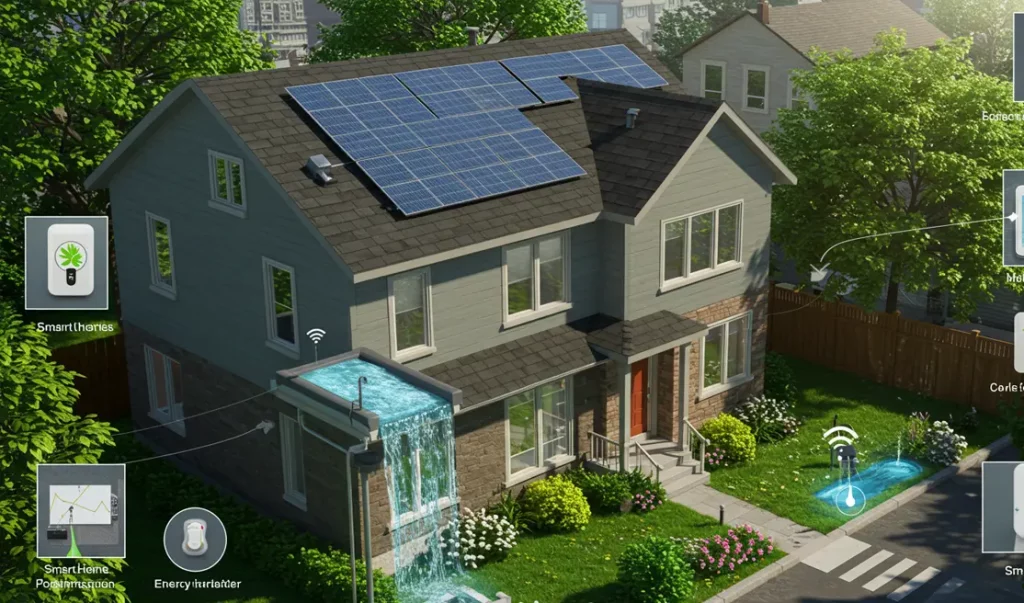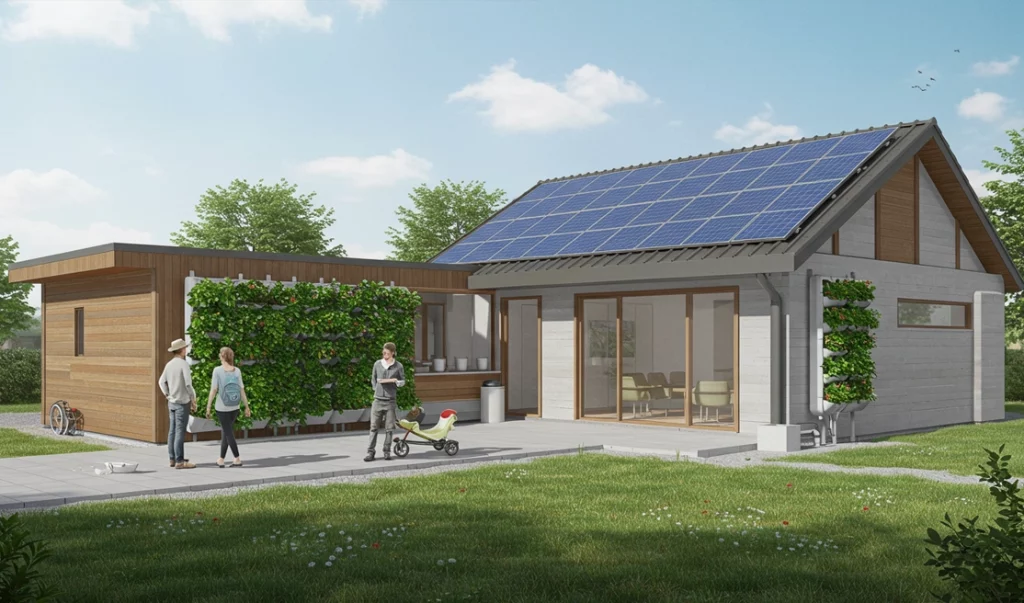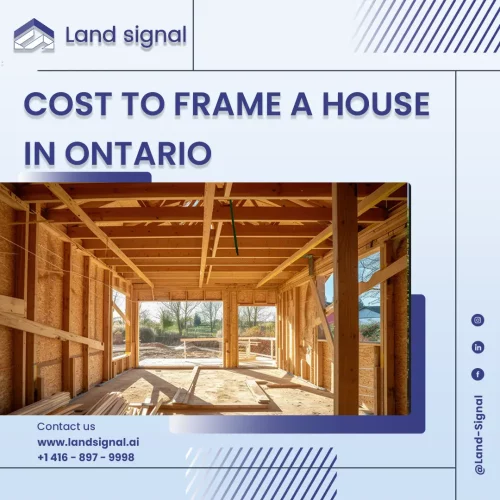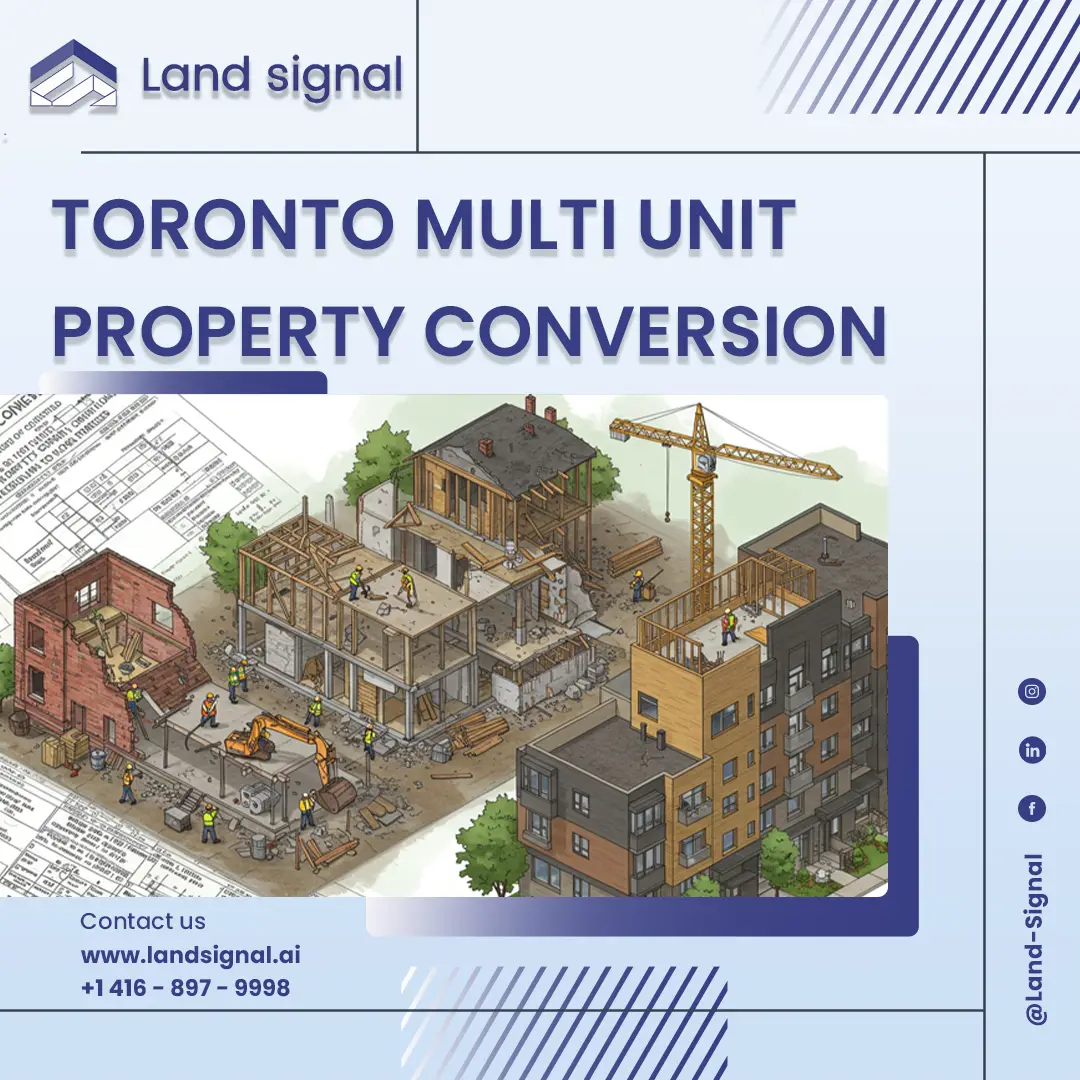Embarking on a home renovation in Toronto presents a unique opportunity to enhance not just your living space but also its environmental performance. Integrating eco-friendly principles isn’t merely a trend; it’s a technically sound approach to creating healthier, more efficient, and valuable homes.
This guide of Landsignal dives into the practical aspects of sustainable upgrades, material choices, navigating expansion projects, understanding costs and incentives, and tackling the crucial permit process within the Toronto context.
We’ll explore actionable strategies that balance environmental responsibility with tangible benefits for homeowners navigating the complexities of modern urban living.
Start Your Project with Confidence
At Land Signal, we assist with construction and renovation permits, as well as Garden House and Laneway Suite designs. Let our experts guide you through every step.
Toronto’s Green Renovation Imperative
Toronto’s ambitious goal of achieving net-zero greenhouse gas emissions by 2040 places a significant focus on the building sector, which accounts for a substantial portion of the city’s carbon footprint (around 56% in recent years).
Existing homes, particularly older stock, often contribute heavily to energy waste. This makes undertaking Eco Friendly Home Renovations in Toronto more than just a personal choice; it’s a contribution to a larger municipal objective.
The city’s variable climate, with cold winters demanding robust heating and increasingly hot summers requiring effective cooling, further underscores the need for energy-efficient upgrades.
Retrofitting homes to higher environmental standards helps mitigate energy consumption, reduces strain on infrastructure, improves indoor air quality, and ultimately creates more resilient and comfortable living spaces year-round, aligning personal benefit with civic responsibility.
Key Eco-Upgrades for Toronto Homes
Transforming your Toronto home into a more sustainable space involves several key upgrades that deliver significant impact. Prioritizing these changes can lead to substantial energy savings and improved comfort:
- Enhanced Insulation This is often the most impactful starting point. Upgrading insulation in attics (to R60 or higher), exterior walls, basement headers, and foundation walls dramatically reduces heat loss in winter and heat gain in summer. Proper air sealing should accompany insulation work to prevent drafts and maximize effectiveness.
- High-Performance Windows and Doors: Replacing old, leaky windows and doors with ENERGY STAR® certified models, particularly those featuring double or triple glazing, low-emissivity (Low-E) coatings, and insulated frames/spacers, significantly cuts down on thermal transfer.
- Efficient HVAC Systems: Transitioning from older furnaces and air conditioners to high-efficiency models, especially cold-climate air source heat pumps, can drastically lower heating and cooling costs. Heat pumps offer both heating and cooling, moving heat rather than generating it through combustion. Pairing these with smart thermostats allows for optimized energy use based on occupancy and schedules.
- Water Conservation: Installing low-flow fixtures like toilets (WaterSense certified), showerheads, and faucet aerators reduces household water consumption without sacrificing performance, lowering utility bills and conserving a precious resource.
- Solar Energy Integration: While an investment, installing photovoltaic (PV) solar panels can generate clean electricity, offsetting your home’s consumption and potentially feeding excess power back to the grid through net metering programs. Solar water heaters are another option to reduce energy used for domestic hot water.
Choosing Sustainable Building Materials
The materials selected for your renovation are crucial to its overall environmental footprint. Opting for sustainable choices extends the benefits beyond energy efficiency.
Consider materials with lower embodied energy (the energy consumed in extraction, manufacturing, and transportation) and those that promote healthier indoor environments. Key categories include:
- Sustainably Harvested or Reclaimed Wood: Look for lumber certified by the Forest Stewardship Council (FSC) or utilize reclaimed wood salvaged from old structures. This adds character while reducing demand for virgin timber. Bamboo, a rapidly renewable grass, is another excellent flooring and cabinetry option.
- Recycled Content Materials: Many building products incorporate recycled content, including insulation (cellulose, made from recycled paper), drywall (some contain recycled gypsum), metal roofing and studs, and composite decking. Countertops made from recycled glass or paper are also available.
- Low-Impact Flooring: Cork flooring is harvested from the bark of cork oak trees without harming the tree itself. Linoleum (made from natural materials like linseed oil) and polished concrete are other durable, lower-impact choices compared to conventional vinyl. When selecting carpet, consider options made from recycled materials or natural fibers like wool.
- Healthy Finishes: Use paints, stains, adhesives, and sealants labelled as low-VOC (Volatile Organic Compounds) or zero-VOC. VOCs can off-gas into your home, negatively impacting indoor air quality. Natural plaster finishes are another healthy and beautiful alternative. Choosing Eco Friendly Home Renovations in Toronto means considering the lifecycle and health impacts of every material brought into your home.
Planning Sustainable Home Expansions
Expanding your living space through additions or secondary suites offers a prime opportunity to embed sustainability from the ground up. Whether you’re planning a second-story addition, a rear extension, or exploring options like garden suites or laneway suite Toronto, integrating eco-friendly design principles during the planning phase is far more effective and cost-efficient than retrofitting later.
Considerations for sustainable expansions include:
- Integrated Design: Work with designers or architects experienced in green building. This involves optimizing orientation for passive solar gain, planning for natural ventilation, designing high-performance building envelopes (insulation, air tightness), and incorporating rainwater harvesting or green roofs where feasible. Careful Laneway Suite Plans are essential for maximizing both livability and sustainability in these compact dwellings.
- Regulatory Compliance: Home expansions in Toronto are subject to complex zoning bylaws and permit requirements. Understanding regulations like the Toronto Laneway Suite Bylaw or limitations on Garden House Size Toronto is critical before finalizing designs. Eco-friendly features might sometimes interact with these bylaws (e.g., roof overhangs for shading, green roof specifications), necessitating careful navigation.
- Material Selection: Apply the principles of sustainable material selection discussed earlier to the new construction. This includes foundation materials, framing, insulation, cladding, roofing, and interior finishes.
- Cost Implications: Be mindful of how sustainable choices affect project budgets. While some green options might have higher upfront costs, they contribute to lower operating expenses long-term. Factors like the overall Home Extensions Toronto Cost or the specific cost of Second-Floor Addition Toronto need to incorporate these sustainable elements during estimation.
Read Also: Home Building Cost Calculator Ontario
Navigating Costs and Incentives
The financial aspect is a major consideration for any renovation. While Eco Friendly Home Renovations in Toronto can sometimes involve higher initial costs for certain materials or technologies (like heat pumps or solar panels), the long-term payback through reduced utility bills, increased home comfort, and higher property value is significant.
Understanding the cost structure, including factors like the Cost to Frame a House in Ontario, which forms a base for many additions, is essential. Fortunately, various financial incentives can help offset these costs:
- Federal Programs: The Government of Canada offers programs like the Canada Greener Homes Loan, providing interest-free loans for eligible energy-efficiency retrofits (note: the Grant portion is no longer accepting new applicants, but the loan remains available).
- Provincial & Municipal Initiatives: Ontario and the City of Toronto offer specific rebates and programs. Toronto’s Home Energy Loan Program (HELP) provides low-interest loans for energy efficiency upgrades, repaid via property taxes. Keep an eye out for targeted rebates on items like heat pumps or insulation upgrades announced periodically. Thoroughly researching these programs before starting work is crucial.
- Project-Specific Costs: Factor in potential cost variations based on the project type. For instance, the cost of garden house Toronto or home addition cost in Toronto will differ significantly, and incorporating green features needs to be budgeted accordingly within these specific project scopes. Often, a home energy assessment is the first step to qualify for incentives.
Securing Permits for Green Builds
Almost any significant renovation or home expansion project in Toronto requires building permits. This process ensures compliance with the Ontario Building Code, zoning bylaws, and other municipal regulations.
When undertaking eco-friendly renovations, especially complex projects like additions, secondary suites, or a Toronto Multi Unit Property Conversion, the permit process can become even more intricate.
You may need to demonstrate how green features meet code requirements or how your project aligns with specific zoning provisions. Navigating the layers of paperwork, interpreting technical drawings, and ensuring compliance with often-complex zoning bylaws can be daunting for homeowners, investors, and even small contractors.
This is where specialized expertise becomes invaluable. Land Signal excels in this area, offering end-to-end support for securing building permits across Toronto and the GTA. Their deep understanding of zoning by-law in Toronto interpretation, and experience managing applications for home extensions, second-story additions, legal basements, laneway/garden suites, and multi-unit projects simplifies this critical phase.
By handling the permit process, Land Signal ensures your Eco Friendly Home Renovations in Toronto proceed smoothly and in full compliance, saving you time, stress, and potential costly delays.
Read Also: Renovation Permit Toronto | Everything You Need to Know Before You Build
Conclusion
Choosing Eco Friendly Home Renovations in Toronto is a smart investment in your property, your comfort, and the city’s environmental future. By focusing on key upgrades like insulation and efficient systems, selecting sustainable materials, planning thoughtfully, and leveraging available incentives, you create lasting value.
Navigating the necessary permits, however, remains a critical step. Don’t let regulatory hurdles slow down your green vision.
Let Land Signal manage the complexities of zoning bylaws and permit approvals for your renovation, addition, or suite project. Seek expert guidance and assistance from Land Signal to navigate the complexities of permits and streamline your path to a successful, greener home.”

